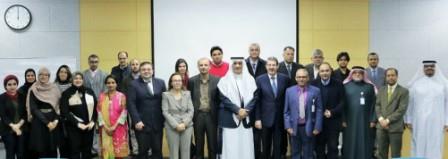
12 March 2017 – In collaboration with Arabian Gulf University in Manama, Bahrain and Tropical Disease Research (TDR), WHO headquarters, the Research Promotion and Development programme in the WHO Regional Office organized a regional workshop from 19 to 21 February 2017 for capacity-building on implementation research as it applies to neglected tropical diseases and diseases of poverty.
The main objectives of the workshop were to:
- introduce the concepts of implementation research;
- apply different study designs for specific TDR topics under community settings;
- use basic statistical analytical techniques, interpretation and presentation of TDR results;
- understand and observe ethical principles in conduct of research on human subjects in tropical areas; and prepare a plan for monitoring and evaluating; and
- disseminate and foster utilization of generated evidence for health policy-makers.
Participants of the workshop included principal investigators of funded EMR/TDR Small Grant Scheme research projects (2016–2017), in addition to participants from AGU, Bahrain Ministry of Health and Pasteur Institute of Tunis aiming at developing their knowledge and skills, with respect to relevant implementation/operational TDR priorities in the Region.
During his opening remarks, Professor Abdul-Rahman Al-Ohali, Arabian Gulf University President, emphasized the importance of addressing infectious and tropical diseases in the countries of the Region in general and the Gulf Cooperation Council countries in particular, which attract millions of economic and tourism business from all countries of the world. Professor Al-Ohaly expressed his appreciation of the joint collaboration between Arabian Gulf Universitya nd WHO headquarters and the Eastern Mediterranean Region, especially in the areas of capacity-building and research to enable the GCC countries to identify innovative and effective interventions to address the prevalent communicable and chronic diseases.
Dr Arash Rashidian, Director of Information, Evidence and Research in the Regional Office in his speech referred to the role of the Department in strengthening the capacity of Member States to generate and innovatively use reliable information and evidence for health system development and health outcome improvement.
Dr Garry Aslanyan, Manager, TDR, WHO headquarters provided a background about the history of TDR, established 40 years ago and hosted by WHO headquarters, and supported by United Nations Children's Emergency Fund, United Nations Development Programme and World Bank. He also emphasized the role of TDR in improving tropical disease early diagnosis and management.
The workshop was facilitated by facilitators from WHO headquarters and Regional office, Arabian Gulf University, Aga Khan University and experts in implementation research using the TDR implementation research toolkit which was designed to:
- identify barriers to implementation and formulate the research question;
- set up a study design and appropriate methodologies; plan the project (budget, personnel, timelines, monitoring and evaluation);
- collect, analyse and present research information;
- develop a dissemination plan;
- monitor and evaluate the research project.
The workshop methodology relied on presenting theoretical concepts followed by related discussions and working group sessions, which enabled principal investigators of selected proposals fine-tune their research projects, prepare their data management, monitoring, evaluation and dissemination plans accordingly.
By the end of the workshop, the principal investigators presented their revised research projects after employing the introduced information and using the acquired skills during the workshop.
Related link
Implementation research toolkit


